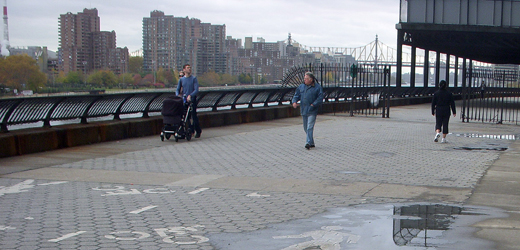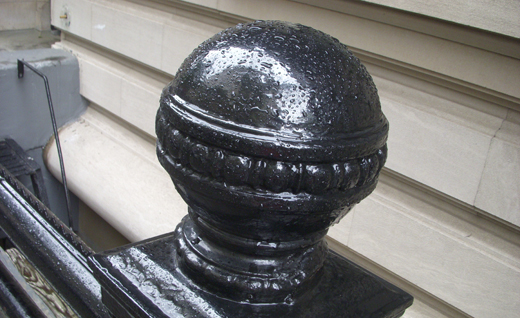Dear Diary: Unless They're True
Thursday, November 19th, 2009
If you know a singer who can take a bunch of songs by such diverse creative talents as Anton Webern, Charles Ives, Carrie Jacobs-Bond, and Irving Berlin, and fashion a program that makes them sound as though they were all written not only at the same time but in the same rooming house as well, I’ll be dutifully impressed. If you had a really good time listening to all of it, I can match you.
That sounds like a great opener for a Portico page about this evening’s cabaret at Café Sabarsky, so I’ll cool it. This is supposed to be a diary entry, not a review. Tom Meglioranza and Reiko Uchida gave an evening of cabaret at the Neue Galerie, just down the road — at the Fifth Avenue end. There was a nice prix-fixe dinner beforehand, with two choices for each of three courses; we drank an agreeably substantial Pannobile along with it. Every table was full; Kathleen estimated that there were about sixty people in the room — once upon a time the dining room over which Grace Vanderbilt’s presided.
We thought we’d miss the event; we were to have flown off to St Croix yesterday. As Kathleen said to Tom afterward, the evening was no small compensation for the bummer of postponing vacation. We laughed and we cried — mostly, we laughed. Tom has a beautiful voice — there’s no need to discuss that. He is also a great entertainer, with a knack for cabaret that makes you forget how few people have it anymore. He weaves an incredibly engaging texture from songs both obscure and overexposed. Carrie Jacobs-Bond, for example, wrote a lot of popular music, most notably “I Love You Truly,” but she also seems to have been the venerable ancestress of the advertising jingle, as evidenced by her Half-Minute Songs. Nothing could be droller, by the way, than Tom’s announcement that he is about to sing a set of “twelve songs” by this rather sentimental composer; he plays it straight, for the groans that his audience is too well-mannered to betray. Two minutes later, they’re laughing like delighted kids. I wish I had written down some of the lyrics to these extremely brief and moralistic deadpans, but one of them, entitled “When They Say the Unkind Things” — you already know half of the words — hinges on the sentiment that sticks and stones may break your bones, but words will never hurt you — unless they’re true.
Show of hands: who knows “I Love You Truly”? This song could reduce my mother to tears, even though most women of her generation probably found it was pretty corny; it reduced their mothers to waterworks. Alfalfa sings it (satirically, I believe; but the performance is a poignant one) in an Our Gang episode. In my early teens, the household acquired a cheesy electric organ for some reason or other. More like an early synthesizer, really, it was nothing but a keyboard on four spindly legs. I used to love to accompany myself singing “I Love You Truly” with full tremolo. (“Used to love”? If I did this three times, I’d die of embarrassment.) The tremolo was mine, not the organ’s. The organ wasn’t up to tremolo.
When Tom finished his tremolo-free rendition of “I Love You Truly,” I detected a certain spouse in the act of eye-wiping. The song that broke me down was “Vienna, City of My Dreams,” the refrain to which stabs me in German (even if Tom sang it in English):
Wien, Wien, nur du allein
sollst stets die Stadt meiner Träume sein.
Tom prefaced the song with an interesting bit of tittle-tattle about the composer, Rudolf Sieczynsky (1879-1952): he was a one-hit wonder who wrote songs when he wasn’t running a POW camp. The song still kills me.
This is sounding a lot like a review. Am I hiding something? I am. Throughout the musical part of the evening, I was tormented by a nether organ that had been irritated, arguably, by my diet of round-the-clock tea. Repletion was very definitely not the problem. Knowing that, I was not in fear of a loss of control. But the burn was intense at times, and it wasn’t helped by the reflection that I’d be having a much better time if only… If only what? Far more soothing was the voice of experience, which reminded me that the eons that I seemed to be slogging through were only minutes (half-minutes, in some cases), and that I would soon be quite content. None of this cerebrofeedback was actually effective as pain control; it was the dandy, high-end fun that got me through.Â
In a perfect world, Tom and Reiko would own the Café Sabarsky in the way that Bobby Short owned the Café Carlyle. The rest of the year, they could do Schubert.



















